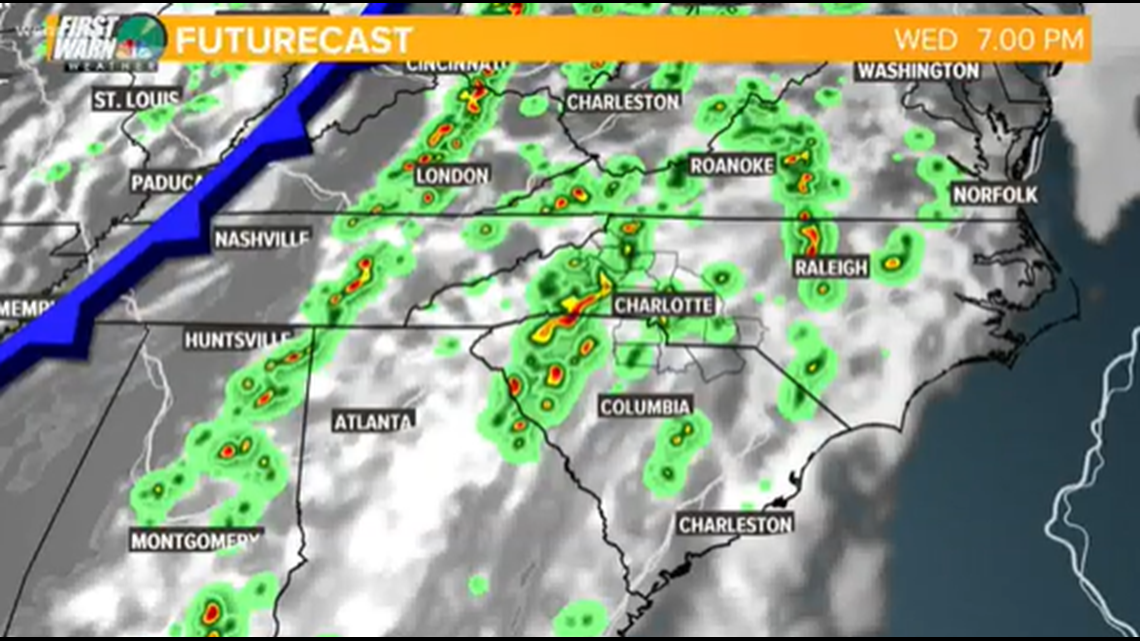Charlotte weather by month: monthly climate averages
Table Of Content

While March starts out with a chilly high of 59 degrees Fahrenheit, the city warms up by the end of May to a pleasant average high of 81 degrees. Meanwhile, the low averages range from 39 to 62, meaning you won't likely experience frigid temperatures, especially in April and May. Still, you should be prepared for rain throughout the season since each month experiences roughly seven to 10 days of rainfall—with the most occurring in April and May. Summer in Charlotte is full of clear skies and warm weather. The summer season runs from June through August and is perfect for the outdoor activities and events Charlotte has to offer. The weather can get extremely muggy and the heat index soars as high as 107 degrees in July when the humidity and temperatures are at their peaks.
Monthly hours of sunshine
The calmer time of year lasts for 5.4 months, from May 17 to October 31. The calmest month of the year in Charlotte is August, with an average hourly wind speed of 4.7 miles per hour. The windier part of the year lasts for 6.6 months, from October 31 to May 17, with average wind speeds of more than 5.9 miles per hour. The windiest month of the year in Charlotte is March, with an average hourly wind speed of 7.2 miles per hour. The heat continues in July, the hottest month of the year in Charlotte. The average heat index in July is a scorching 107.2°F, so avoid sustained outdoor activity in the heat of the day to guard against heat cramps and heat exhaustion.

When it does not snow in Charlotte?
4.3 inch. To get a sense of how much these sources agree with each other, you can view a comparison of Charlotte and the stations that contribute to our estimates of its temperature history and climate. Please note that each source's contribution is adjusted for elevation and the relative change present in the MERRA-2 data. The topography within 2 miles of Charlotte contains only modest variations in elevation, with a maximum elevation change of 161 feet and an average elevation above sea level of 699 feet.
Climate & Weather Averages in Charlotte, North Carolina, USA
Weather IQ: The wettest month in Charlotte - WCNC.com
Weather IQ: The wettest month in Charlotte.
Posted: Wed, 03 Aug 2022 07:00:00 GMT [source]
The average heat index is still quite high in August, estimated at 102.7°F, meaning you’ll want to take necessary precautions as in June and July. August sees 16.9 days of rainfall on average and accumulates 2.6″ of precipitation. January is the coldest month in Charlotte, and the weather is chilly. It rains about 8.7 days, with typically 1.46″ of accumulated precipitation. It snows about 1 day in January and only accumulates 0.59″.

The month with the lowest relative humidity is May (60.38 %).The wettest month is July (13.73 days). There is a difference of 32 mm
Average humidity Charlotte, NC
Charlotte has seen its share of extremes, though, with the hottest temperature ever recorded at 104 degrees and the coldest at -5—both of which have occurred several times throughout the city's history. The best times to visit Charlotte are in spring, March through May, or in autumn, September through November. In spring, the flowers are in full bloom, the weather is great, and you can take advantage of many recreational activities, like swimming and going to the park. In autumn, the temperature is mild and the leaves change to brilliant shades of red and yellow.
The cloudiest month of the year in Charlotte is January, during which on average the sky is overcast or mostly cloudy 49% of the time. The clearest month of the year in Charlotte is October, during which on average the sky is clear, mostly clear, or partly cloudy 65% of the time. Shkodër, Albania (5,111 miles away); Fūman, Iran (6,505 miles); and Yangzhong, China (7,967 miles) are the far-away foreign places with temperatures most similar to Charlotte (view comparison). Comcast said customers who had Bally Sports as part of their cable package will see a monthly credit automatically applied to their bills to compensate for the lost channel. The months with the highest visibility are January, February, March, April, May, June, July, August, September, October, November and December (6mi). The months with the lowest visibility are January, February, March, April, May, June, July, August, September, October, November and December (6mi).
The 90-degree heat can arrive as early as April or as late as October. The first set of high and low temperatures are averages for 2010 to 2019. Fortunately, Charlotte is strategically located to avoid major disasters. Its suburbs are surrounded by water and act as good weather regulators. Charlotte occasionally gets hit with tropical storms and hurricanes, which can lead to flooding.
Severe Thunderstorm and Heavy Rainfall Threats for the Center of the Nation; Near Record Warmth for the East
The month with the least rainy days is November (7.8 days). The windiest month (with the highest average wind speed) is April (7.6mph). The calmest month (with the lowest average wind speed) is August (4.4mph). Our beach/pool temperature score is 0 for perceived temperatures below 65°F, rising linearly to 9 for 75°F, to 10 for 82°F, falling linearly to 9 for 90°F, and to 1 for 100°F or hotter.
The brightest month of the year in Charlotte is June, with an average of 6.8 kWh. The snowless period of the year lasts for 9.1 months, from March 4 to December 8. The least snow falls around July 27, with an average total accumulation of 0.0 inches.
Our tourism temperature score is 0 for perceived temperatures below 50°F, rising linearly to 9 for 65°F, to 10 for 75°F, falling linearly to 9 for 80°F, and to 1 for 90°F or hotter. We base the humidity comfort level on the dew point, as it determines whether perspiration will evaporate from the skin, thereby cooling the body. Lower dew points feel drier and higher dew points feel more humid. Unlike temperature, which typically varies significantly between night and day, dew point tends to change more slowly, so while the temperature may drop at night, a muggy day is typically followed by a muggy night. Daylight saving time (DST) is observed in Charlotte during 2024, starting in the spring on March 10, lasting 7.8 months, and ending in the fall on November 3. The month with the least rain in Charlotte is January, with an average rainfall of 3.0 inches.
Comments
Post a Comment